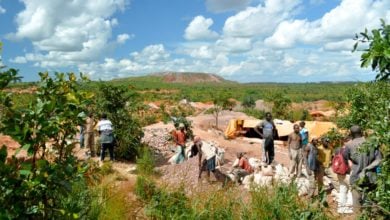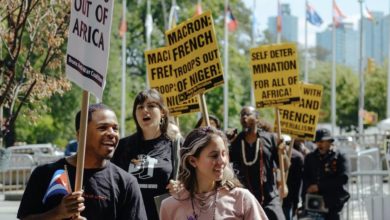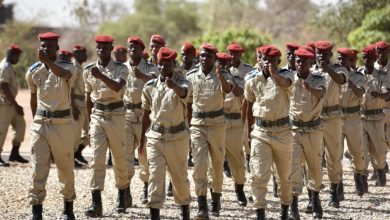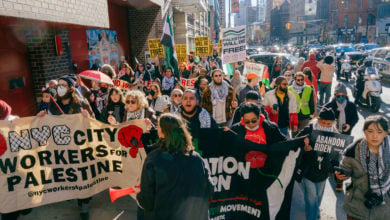The U.S. government has had a longstanding interest in undermining the central government in Sudan.
Recently, the Bush administration decided to increase U.S. pressure on the country. The Feb. 7 Washington Post
|
The Bush administration’s new round of coercion is part of what is being called “Plan B.” It was already “stealthily launched” last month when four U.S. Army colonels were stationed as observers on the Sudan-Chad border. This was done in full view of Sudanese intelligence.
The unannounced move was intended as a signal to Khartoum, which the administration accuses of launching a “quiet war” against Chad’s government to widen the Darfur conflict.
The Khartoum government has taken various positions about U.S. interference in its affairs over the past few years. It has shown willingness to negotiate its sovereignty to secure peace. The Sudanese government, in an effort to placate the Bush administration, tried cooperating on intelligence in the “war on terror” in 2005.
But U.S. pressure about the civil war in Sudan’s Darfur region has crossed a line. Sudanese President Omar Al-Bashir and the section of the ruling class he represents have resisted imperialist intervention in this matter.
Darfur conflict
The civil war Darfur began in 2003. Its origin lies in the economic realities of Sudan, in the U.S. desire to destabilize the Sudanese government and in the context of inter-imperialist rivalries in Africa. The war is not a “genocide” sponsored by the Sudanese government against certain tribes in Darfur. This grave distortion is widely touted in the capitalist press and among liberals.
The three million inhabitants of the Darfur region are organized into dozens of tribal groups. Widespread intermarriage between the groupings has created broad similarities between the groups, both physically and culturally.
For example, the vast majority of both “Arab” and “African” tribes are Black and nearly all are Muslim. The cultural distinction between tribes is language—the “Arab” tribes speak a dialect of Arabic, while the “African” tribes speak a variety of local African languages.
The roots of any distinction between the groups are economic, not physical or cultural. The “African” tribes like the Fur and the Masalit are primarily peasant farmers. The “Arabic” tribes like the Rezegeit and the Habbaniya are primarily nomadic people, earning their living by herding camels and cattle.
These two groups have been in competition for land and water for decades, especially since the droughts in the 1980s forced the nomadic herders from the northern desert region into the more fertile area of southern Darfur.
In the mid-1980s, the Sudanese government provided arms to some of the herder tribes, not to fight against their farmer rivals, but against the CIA-supported Sudanese People’s Liberation Army. This is the base of the so-called Janjaweed—literally, “armed horsemen.” As even some members of the Save Darfur Coalition state: “Those leading [the] rebel and government forces are both Muslim and both African Sudanese.”
The SPLA launched an uprising against the central government in 1983 in the service of imperialism. The civil war lasted over 20 years and is related to the present Darfur conflict.
In the 1980s and 90s, the Save Darfur Coalition and other groups now calling for an end to the violence in Darfur, were not paying any attention to the country. U.S. intervention in Sudan was viewed as an acceptable power play in the Cold War. Sudanese sovereignty could be sacrificed at the altar of “fighting communism.”
Today, the new war is against “terror,” as delineated by the Bush administration, and the people of Sudan are once again in the cross hairs of imperialism. But this time, the imperialists have whipped up a frenzy among liberal and imperialist-funded groups—all in the interests of U.S. imperialism.
The stark example of Iraq shows the logical conclusion of championing U.S. or U.N. intervention in Sudan.
New threats
The core of the recent U.S. Treasury Department plan implemented by Bush “rests on an executive order issued by
|
Clinton, it should be remembered, ordered the bombing of a Sudanese pharmaceutical plant in 1998 under the guise of disarming Sudan’s illusory “biological weapons.” The plant, which produced 50 percent of the medicine Sudan, one of the world’s poorest countries, was completely destroyed.
This war crime led to tens of thousands of deaths from diseases like malaria and tuberculosis in the following years.
In addition to the Treasury plan, the Pentagon’s recent announced creation of an Africa Command targets Sudan and any other independent or quasi-independent country on the African continent. The centralized Africa Command will, in the words of the U.S. government, “oversee security, cooperation, building partnership capability, defense support to nonmilitary missions, and, if directed, military operations on the African continent.”
In the face of threats and actions like these, the Sudanese government has taken steps to reach a diplomatic solution to the Darfur conflict, but on its own terms. They even allowed thousands of African Union troops into the country several years ago. This has been unacceptable to Washington.
The interference of imperialism has only exacerbated the situation. A peace treaty with most, but not all, rebel groups in May 2006 was viewed by the imperialists as unimportant. But a civil war can only come to an end when both sides agree to cease hostilities, or after one side wins.
The imperialists have been pushing for a strictly United Nations-led “peacekeeping” force in Sudan for many months. Any U.N. force would be dominated by the former colonizing, now imperialist, countries and be heavily influenced by the United States. All of these imperialist powers want regime change or neo-colonial subjugation for Sudan.
Under the weight of this imperialist pressure, Sudan has given into some of the imperialist demands. It has accepted the demand of U.N. troops in Sudan. But, it is requesting for a joint African Union-U.N. task force under the firm control of the African Union. Even this request has been met with resistance. Sudan and the United Nations are not disagreeing about whether U.N. troops will be let in, but how many.
Sudan has indicated that it would accept 12,000 troops. There are already 7,000 A.U. troops in the country. The imperialists, however, want to send 17,500 foreign troops and 3,000 police to intervene. Whatever number is reached, the imperialists likely will not be satisfied.
Threats against Sudan’s sovereignty will not end until they get exactly what they want—total control of Sudan, its resources and its people.
The task for socialists and all progressives in the United States and around the world is clear. We must demand self-determination for Sudan and oppose all foreign intervention, threats and provocations.
Click here to read more from the PSL on Sudan.







